
Do you forget your appointments, name of a person, what were you going to do? This can be normal as a person can forget certain things at a certain time, but if it is becoming very frequent or troublesome then it could be Alzheimer’s disease. People with Alzheimer's disease (AD) have problems with memory, thinking and behaviour. Increasing forgetfulness is one of the initial symptoms of Alzheimer's disease (AD). They tend to forget (such as names, places and things) which develops slowly and worsen as the disease progresses and can become severe enough to interfere with their daily life and tasks.
Also read: Alarming Symptoms of Alzheimer's Disease You Must Know

Read: Memory Loss with Ageing
- Memory loss that affects day-to-day function: Anyone can occasionally forget appointments, a known person’s name or a friend's phone number--but the person usually remember it sometime later. But a person with AD may forget about conversations, appointments or events, and not remember them even later. This is more with recent events as the recent memory is affected initially. However, as the disease progresses memory loss worsens gradually and the person can have difficulty in remembering things that happened recently or in the past, names of people they know (even family and friends), recognizing family members and friends, trouble while speaking, reading or writing.
- Difficulty performing familiar tasks: All of us have occasional memory lapses like you may prepare vegetable and only remember to serve them at the end of a meal. However, a person with AD may have trouble with an everyday task like operating the washing or grinder or cooking a meal and in the later stage of disease doing everyday tasks like brushing teeth or combing hair.
- Problems with language: Anyone can occasionally have trouble finding the right word. But people with AD may forget simple words or substitute words, which may make their sentences difficult to understand or totally meaningless. As the disease progresses they may find it difficult to express thoughts or take part in conversations. Slowly the reading and writing skills are affected as well.
- Disorientation of time and place: You may forget the date or day of the week or where you were going (for a moment) occasionally. But AD may cause memory loss and forgetfulness to progress to a stage where the person can get lost in familiar places and may have no idea where is he or what day and month it is.
- Misplacing things: It is normal to misplace the keys or wallet occasionally. But people with AD may put things in inappropriate places like clothes in the freezer or keys in the sugar bowl and then forget it.As the disease progresses the person’s ability to interpret things, organize thoughts and remember things becomes difficult.
A person with AD may initially notice that he has difficulty in remembering things and organizing thoughts. But mostly the person may not notice anything and it is the people around him (like family members, friends or co-workers) who feel the change or feel that something is wrong. If any of your family and friends show inappropriate forgetfulness or other symptoms of AD consult a doctor. There is no cure for AD but treatment may possibly slow down the progression of the disease, improve symptoms and improve the quality of life for those with Alzheimer's and their caregivers.
Read more articles on Mental Health.
For more related articles, download OnlymyHealth app.
How we keep this article up to date:
We work with experts and keep a close eye on the latest in health and wellness. Whenever there is a new research or helpful information, we update our articles with accurate and useful advice.
Current Version